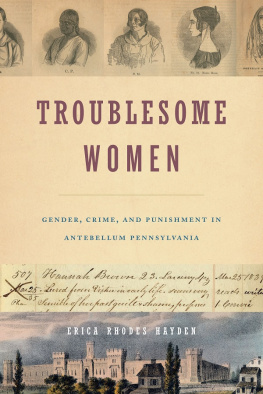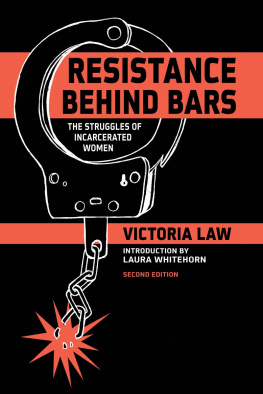Offending Women
Offending Women
POWER, PUNISHMENT,
AND THE REGULATION OF DESIRE
LYNNE A. HANEY

University of California Press, one of the most distinguished university presses in the United States, enriches lives around the world by advancing scholarship in the humanities, social sciences, and natural sciences. Its activities are supported by the UC Press Foundation and by philanthropic contributions from individuals and institutions. For more information, visit www.ucpress.edu .
University of California Press
Berkeley and Los Angeles, California
University of California Press, Ltd.
London, England
2010 by The Regents of the University of California
Library of Congress Cataloging-in-Publication Data
Haney, Lynne A. (Lynne Allison), 1967.
Offending women : power, punishment, and the regulation of desire / Lynne A. Haney.
p. cm.
Includes bibliographical references and index.
ISBN 9780-520261907 (cloth : alk. paper)
ISBN 9780-520261914 (pbk. : alk. paper)
1. Female offendersCaliforniaCase studies. 2. Female offendersRehabilitationCaliforniaCase studies. 3. Correctional institutionsCaliforniaCase studies. I. Title.
HV6046.H36 2010
365.4309794dc22 2009020586
Manufactured in the United States of America
19 18 17 16 15 14 13 12 11 10
10 9 8 7 6 5 4 3 2 1
This book is printed on Cascades Enviro 100, a 100% post consumer waste, recycled, de-inked fiber. FSC recycled certified and processed chlorine free. It is acid free, Ecologo certified, and manufactured by BioGas energy.
For my guys, Andrs and Tristan
Acknowledgments
Any project that spans as long a time frame as this one necessarily becomes a collective effort. I began the research for this book in 1992, when I was still a graduate student in the Department of Sociology at UC Berkeley. Were it not for this outstanding department, and the many relationships I formed in it, I would have never pursued the projectand possibly would not have become a sociologist at all. While at Berkeley, I was extremely fortunate to be part of two writing groups, both of which contributed to this bookparticularly the analysis in to his graduate students. In many ways, this book is a testament to that commitment. There were many other friends, colleagues, and professors at Berkeley who supported and encouraged this work, including Nancy Chodorow, Louise Lamphere, Kristen Luker, Jerome Karabel, Shana Cohen, Sharon Cooley, Laura Lovett, Elizabeth C. Rudd, Lisa Pollard, and Suava Salameh.
Of the many things I learned while a graduate student, perhaps the most important was an appreciation for feminist sociology. In fact, gender studies was such an integral part of my graduate education that it never occurred to me to think of it as anything but a central part of the discipline. It was not until I left Berkeley that I learned just how slow the feminist revolution has been in coming to sociology overall. A rude awakening, indeed. Yet it is no overstatement to say that this book is a product of the changes brought about by this revolution. Over the course of the fifteen years I worked on it, I have received an enormous amount of support and encouragement from many feminist scholars. Yet there were two divine interventions from gender scholarsone of whom I didnt even knowthat came at particularly important junctures and thus led me to develop this project in ways I might not otherwise have pursued.
The first came in 1995 when Paula England, then editor of the American Sociological Review, saw promise in a paper based on the first institutional case study in this book and decided to publish it. At that time, ASR rarely published the work of graduate students and almost never of ethnographers. Although I would only meet her years later, when the article won an ASA award, Paulas encouragement of me as a young sociologist was transformative. It was exactly what I needed to convince me that I had a place within sociology and that the discipline was indeed open to the kind of scholarship I wanted to produce. The second intervention came years later, when I was giving a talk based on that same article in one of Linda Gordons classes at NYU. Linda had always been an amazing advocate of my work, and after this lecture she pushed me to develop my research further, insisting that there was a book here and that I must already have enough fieldnotes to write it (I did). Im sure she doesnt even remember that conversation, but it had a lasting impression on me. The seeds of the idea for a follow-up study were planted. The next year, I began my fieldwork at Visions. I mention these acts of intellectual support and generosity because they evidence the real, concrete ways that having feminist scholars in positions of influence can, and have, changed the discipline. And these women provide models for me as I now to try to support a new generation of feminist scholars.
Over the years, countless other encouraging acts have come from folks I am fortunate to call both colleagues and friends. At NYU, Ruth Horowitz, Kathleen Gerson, and Jo Dixon have been my confidants for more than a decade; I thank them for their support and good humor. Were it not for our womens dinners, which have grown to include Ann Morning, Florencia Torche, Willie Jasso, and Caroline Persell, departmental life would be far less fun and I would be far less sane. Directly and indirectly, I have learned a tremendous amount about the issues discussed in this book from many of my NYU colleagues, including Larry Wu, Tom Ertman, David Garland, Steven Lukes, Neil Brenner, and Dalton Conley. My students are also a constant source of new ideas and inspiration. For their contributions to this book, I thank Allison McKim, Amie Hess, Lienna Gurevich, Miranda March, Dorith Geva, and Sarah Kaufman.
Outside of NYU, many scholars have contributed to this work in immeasurable ways. For listening to me talk endlessly about the research and for writing letters of support for it (often at a moments notice), I thank Ann Orloff, Nina Eliasoph, Rickie Solinger, Gail Kligman, and Jill McCorkel. Others have provided excellent feedback on papers and talks based on this book, particularly Rachel Roth, Kelly Hannah-Moffat, Julia Adams, Myra Marx Feree, Tom Hilbink, and Eileen Boris. In 200405 I was fortunate to serve as a Fulbright New Century Scholar, which not only gave me the time and space to begin writing this book but also connected me to a remarkable group of international feminist scholars. I learned a tremendous amount from our discussions, debates, and travels. For their comments on many of the ideas in this book, I must thank my Fulbright comrades Carolyn Elliott, Christina Ewig, Wendy Chavkin, and Isabella Bakker. I am also extremely fortunate to have found an outstanding editor and champion in Naomi Schneider. Sociology as a whole would be a far less interesting discipline without her.
Ethnographers make a living intruding on peoples lives and asking them to make room for us. I did a lot of intruding during this project and I owe an enormous amount to the women who tolerated me day after day. Given how much they taught me over the years, it seems insufficient to thank them anonymously. I hope many of them will recognize themselves in the book. And I hope I did justice to their sense of injustice. I also must apologize to many of them for not using the pseudonyms they asked me to give them in the book: Im afraid Nastygirl, Gang-stamama, and Sweet-thang just wouldnt have made it through the editing process. Sorry.
While my experiences in the two penal facilities I studied pale in comparison to those of the women residing in them, they did take their toll on my well-being and state of mind. This was especially true of my time at Visionsas I spent my days watching focus seats and competitive confessionals, I frequently left feeling depressed, defeated, and angry. Had I not had a warm and loving family to return home to, I might have become uncomfortably numb myself. On the left coast, the Haney-Hurtado clan often embraced me and corroborated my angst; I thank them all for their insights into the legal system and for their unwavering commitment to social justice. I am especially grateful for my father, whose work reforming the penal system and making the world a better place is awe-inspiringand has left a deep imprint on both my work and my life. On the other coast, which I now call home, the Yurko clan was always there for me with great meals, big celebrations, and good memories. My mother, step-father, and sister have sustained me through the good years and the bad: I thank my mom for being a true inspiration as a scholar, a parent, and a feminist; Rudy for being a kind and constant source of support; and Jess for striking the perfect balance between friend and sister.
Next page




